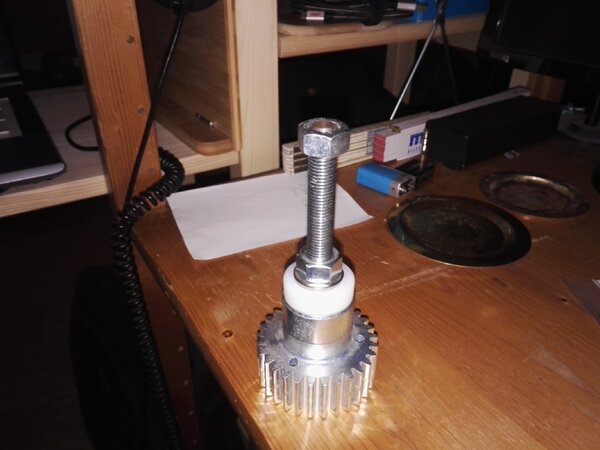
audiomick
Members-
Posts
2,456 -
Joined
-
Last visited
-
Days Won
48
Content Type
Profiles
Forums
Events
Gallery
Community Map
Everything posted by audiomick
-
And now for something completely different (again ) I became aware of this bloke through a TV documentary. I had never heard of him, and was amazed. Amongst other things, hearing what he did explains why anyone could possibly think hip-hop is ok. They are all trying to do what he did, but can't. Anyway... Gil Scott Heron. Enjoy...
-
2024 Galveston Lone Star Rally - Till November 3rd -
audiomick replied to p6x's topic in Meetings, Clubs & Events
I don't think it is my kind either, going by that advertisment posing as news. -
Struggling to separate the two halves of the drive shaft
audiomick replied to Molly's topic in Technical Topics
Doesn't look all that good... -
I never knew Springsteen wrote that. Just went looking and found out. Still, I prefer what Manfred Mann did with it. While we're at it, this is great, always was and always will be... And since Chris Thomspon is such a legend, this too. Johnny Farmhand got famous (again) with it, but Chris wrote it. And since we've mentioned John Farnham, this was his first hit. I don't know if anyone outside of Australia ever heard of it...
-
And now for something completely different... We studied this piece at the University. Coltrane is mostly playing arpeggios, which, at 130 bpm, is not really surprising. Interesting is how the pianist launches into his solo, and after a while just gives up and starts playing chords. Shortly afterwards, Coltrane takes over again. EDIT: for anyone who wants to have a go at it... https://musescore.com/user/498481/scores/6680232
-
And just for the hell of it, because the topic is apparently currently relevant in Texas: That should be the whole album. If not,maybe this: https://www.youtube.com/watch?v=iwCQJcTYWzA&list=PL02pDPRbhcyYrRtZq7YM7jVvpwOVrB8ZG EDIT: PS, I was planning to go to bed shortly. I think that is not going to happen now. Have to listen to what I posted...
-
There is something about old farts who have been playing together for years that is quite unique, and really nice. Anyway... Having posted a link to "Made in Japan" (in my opinion probably the best live recording ever) I got to thinking about "best albums". Amongst my favourites, the common factor being a certain David Robert Jones, these two: (not actually my favourite song on the album, but one can hear Mr. Jones singing backing vocals from about 3:40) and one from the man himself and perhaps not one of the "best ever", but certainly worth mention and a product involving the said Mr. Jones But when one is on the subject of "best albums ever", is this one unavoidable, albeit on a completely different track ...
-
look here: https://guzzitek.org/gb/accueil_gb.htm I think this might be what you are looking for https://guzzitek.org/utilisation/gb/1100/V11_2004_112003_Util.pdf
-
Very nice, and nice to know that they kept on going. Al Jackson's cousin isn't quite the drummer that Al was. He took about half of the song to get in the groove, I reckon. But maybe it was just a bad moment. What I mean is how, in a really grooving band, not everyone is actually right on the beat. A good example is this: the drummer is just a bit ahead, the bass player is on, and the guitarist is just a tiny bit behind. That is how the magic happens. And as far as Hammond players go, the best ever. And a nice bloke into the bargain, a real Gentleman...
-
Guzzi V11 Le Mans 2000...Starting issues
audiomick replied to David Sandbrook's topic in Technical Topics
are generally more interested in selling new vehicles than keeping old ones running. Jus' sayin'... -
It's your fault, @docc and then I went looking where the song (which I quite liked when it came out, when I was about 13 years old) came from. Following the chain, I inevitably landed here. I've actually got this version on a DVD called "Remebering Otis" which features an Otis Redding concert in Europe, and the backing band were these blokes.
-
Sport 1100i Ring Gear and Clutch removal.
audiomick replied to John Neeson's topic in Technical Topics
In the certain knowledge that a centering tool is required to re-assemble the clutch on the big-block guzzis, and that my clutch may well become due in the foreseeable future (the bike has about 70,000 km on the clock...) I bought one of these when a bloke in the German forum made a batch of them and offered them for a very reasonable price. I think I am now beginning to understand how it is supposed to work. Thanks very much. -
From the album: audiomick
-
From the album: audiomick
-
Guzzi V11 Le Mans 2000...Starting issues
audiomick replied to David Sandbrook's topic in Technical Topics
Stein-Dinse and Wendel too... https://www.stein-dinse.com/de/search.html?grp=&searchStr=01114390 https://wendelmotorraeder.de/ansauggummi-sp1100iv11brgr_gu01114390-p-1034021.html?ref=expl I bought some only a couple of months ago. From Wendel, I think.





